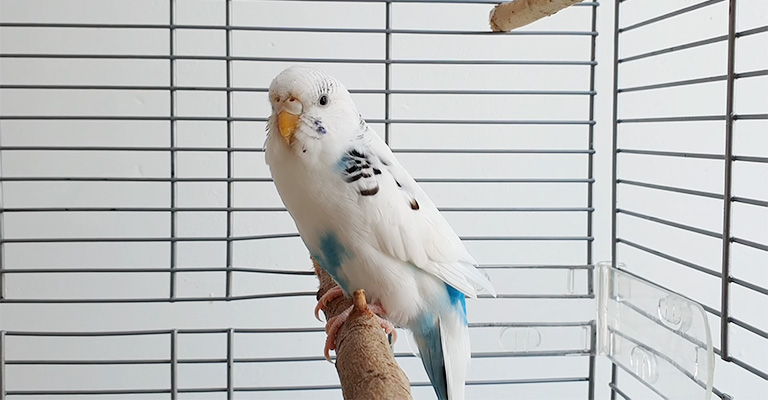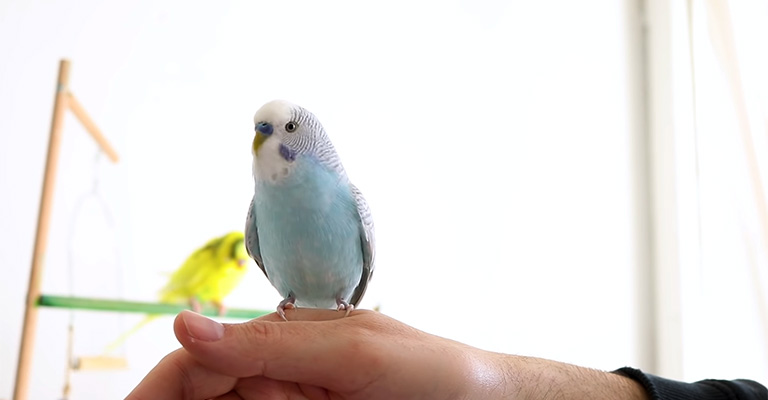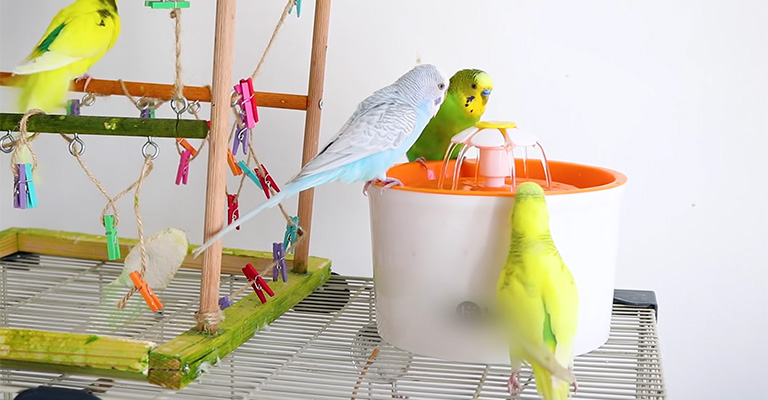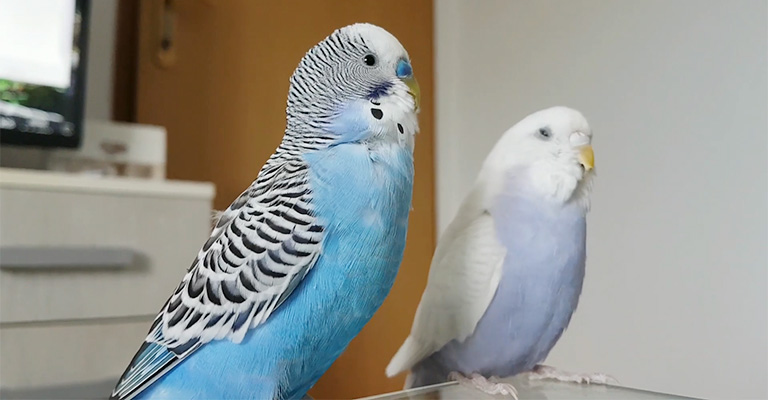Why is my new budgie not moving? This question may arise when welcoming a budgie into your home and observing its seemingly immobile state. Budgies, also known as parakeets, are delightful and colorful pet birds renowned for their sociability and playful nature.
Understanding budgie behavior is of utmost importance for every budgie owner, as it allows us to provide a nurturing and stimulating environment for these avian companions.
In this article, we will explore the captivating world of budgie behavior, shedding light on the possible reasons behind their stillness and offering insights into their unique characteristics.
By delving into their behavior patterns and needs, we aim to comprehensively understand budgie behavior, empowering owners to create a harmonious and enriching relationship with their feathered friends.

Why is my new budgie not moving?
If your new budgie is not moving, assessing the situation and considering potential reasons for their lack of activity is essential. Here are a few possible explanations:
Stress and Adjustment Period
Moving to a new environment can be stressful for budgies. They may adjust to their new surroundings, especially if they are recently introduced to a new home or cage.
During this adjustment period, budgies may exhibit decreased activity levels and appear more reserved or hesitant. Provide a calm and quiet environment, offering them time to acclimate at their own pace.
Illness or Injury
Budgies may become inactive or immobile if they are unwell or have sustained an injury. Health issues such as infections, nutritional deficiencies, respiratory problems, or injuries to their wings or legs can cause budgies to be less active.
Observe their behavior closely for other signs of illness or injury, such as changes in appetite, breathing difficulties, or physical abnormalities.
If you suspect your budgie is unwell, it is advisable to consult with an avian veterinarian for a proper diagnosis and appropriate treatment.
Environmental Factors

Budgies are sensitive to their surroundings, and certain environmental factors can affect their activity levels. Extreme temperatures, drafts, loud noises, or disturbances in their immediate environment can make budgies less inclined to move around.
Ensure that their cage is located in a quiet, well-ventilated area away from direct sunlight, drafts, and any potential sources of stress or discomfort.
Behavioral Adjustment
Some budgies may initially exhibit a more cautious or reserved behavior when introduced to a new environment. This is a natural response as they assess their surroundings and become familiar with their new home.
Over time, as they gain confidence and become accustomed to their environment and human caregivers, they will likely start to exhibit increased activity and actively explore their surroundings.
If your budgie’s lack of movement persists, or if you observe any concerning symptoms or changes in their behavior, it is always best to seek professional advice from an avian veterinarian.
They can thoroughly examine and offer specific guidance based on your budgie’s needs and circumstances.
What To Do If My Budgie Not Moving?

If your budgie is not moving, it’s essential to take action to ensure their well-being. Here are some steps you can take:
Assess the Environment
Check the immediate environment to ensure it is safe and suitable for your budgie. Ensure the cage is secure, free from potential hazards, and located in a quiet area away from extreme temperatures, drafts, or excessive noise. Ensure the cage is adequately equipped with perches, toys, fresh food, and water.
Observe for Signs of Illness or Injury
Carefully observe your budgie for any signs of illness or injury. Also look for changes in appearance, such as fluffed feathers, discharge from the eyes or nostrils, or visible injuries.
Monitor their behavior for decreased appetite, difficulty breathing, or abnormalities in droppings. If you notice any concerning symptoms, it is crucial to seek veterinary attention promptly.
Offer Food and Water

Ensure fresh food and water are readily available to your budgie. And offer a balanced diet of various seeds, pellets, and fresh fruits and vegetables. Inactivity can sometimes be related to a lack of energy or poor nutrition.
If your budgie needs to show interest in food, try offering their favorite treats or foods high in nutritional value to entice them.
Provide a Calm and Quiet Environment
Budgies can be sensitive to their surroundings, and a calm environment can help reduce stress and encourage movement. Minimize loud noises, sudden actions, and other potential stressors in their vicinity.
Creating a peaceful, relaxed atmosphere can make your budgie feel more comfortable and move around.
Seek Veterinary Advice
If your budgie’s lack of movement persists, worsens, or is accompanied by other concerning symptoms, it is crucial to seek professional advice from an avian veterinarian.
They can thoroughly examine, diagnose underlying health issues and recommend appropriate treatment.
Remember, budgies are naturally active and social birds, so a lack of movement is generally a cause for concern. Prompt veterinary attention is crucial to ensure the well-being of your budgie and address any potential health issues they may be experiencing.
How To Know If My Budgie Is Facing Some Health Issues?

Recognizing potential health issues in budgies requires careful observation and attention to their behavior, appearance, and overall well-being.
Here are some signs that may indicate your budgie is facing health issues:
Changes in Appetite
A sudden decrease or increase in appetite can indicate underlying health problems. Monitor your budgie’s eating habits and note if they eat significantly less or more than usual.
Changes in Droppings:
Pay attention to your budgie’s droppings. Any significant changes in color, consistency, or frequency can indicate digestive issues, infections, or other health concerns.
Healthy droppings should have a firm, dark center (feces) surrounded by white urine.
Changes in Activity Levels
Budgies are generally active birds, so a sudden decrease in activity or lethargy can be a red flag. If your budgie spends more time sitting at the bottom of the cage, fluffed up, or showing a lack of interest in toys or perches, it may indicate an underlying health problem.
Respiratory Issues
Watch for any signs of respiratory distress, such as wheezing, rapid breathing, sneezing, or discharge from the eyes or nostrils. Respiratory problems can be indicative of infections or respiratory diseases.
Changes in Feather Condition
Healthy budgies have sleek and well-groomed feathers. Look for signs of feather plucking, excessive preening, bald patches, or rough, unkempt feathers. These may indicate underlying health issues, stress, or behavioral problems.
Weight Loss or Gain
Monitor your budgie’s weight regularly. Sudden weight loss or gain can indicate health problems, such as malnutrition, digestive issues, or hormonal imbalances.
Behavioral Changes
Unusual behavior can be a sign of health issues. Pay attention to changes in vocalization, aggression, excessive sleeping, or unusual posture.
Additionally, if your budgie exhibits balance problems, difficulty perching, or favoring one leg, it may indicate an injury or neurological issue.
Eye and Beak Abnormalities
Check your budgie’s eyes for signs of swelling, discharge, redness, or cloudiness. Similarly, monitor the beak for abnormalities such as overgrowth, discoloration, or deformities.
Changes in Vocalization
Budgies are known for their chirping and singing. Any significant changes in their vocalization patterns, such as a sudden decrease in vocalizations or a persistent change in the tone or pitch of their sounds, could indicate underlying health problems.
It’s important to note that these signs can vary depending on the specific health issue, and individual budgies may display different symptoms.
If you notice any concerning signs, it’s best to consult with an avian veterinarian for a professional assessment and appropriate treatment. Regular check-ups with a veterinarian are also recommended to ensure your budgie’s ongoing health and well-being.
Frequently Asked Questions
The adjustment period for a new budgie can vary, typically lasting between a few days to a few weeks. Patience and providing a consistent routine help ease the transition.
Minimizing sudden loud noises, avoiding excessive handling, and providing a quiet and calm environment can help alleviate stress and anxiety in budgies. Additionally, ensuring a proper diet and introducing toys for mental stimulation can promote well-being.
Signs of illness or injury may include a lack of movement, fluffed-up feathers, decreased appetite, abnormal droppings, discharge from the eyes or nostrils, or changes in vocalization. If you observe these symptoms, seeking veterinary assistance promptly is crucial.
Budgies enjoy a variety of toys, such as swings, ladders, and puzzle toys, that provide mental and physical stimulation. Additionally, offering fresh branches for perching or encouraging supervised flight within a safe environment can promote movement.
If your budgie’s lack of movement continues despite efforts to reduce stress and create a suitable environment, it is essential to consult an avian veterinarian. A professional can evaluate the budgie’s overall health and determine if underlying medical issues require treatment.
Conclusion
When a new budgie appears less active than expected, it is crucial to evaluate potential factors contributing to its lack of movement. The adjustment period, stress, illness, or injury can all affect a budgie’s activity levels.
By implementing the suggested solutions and seeking professional veterinary care when needed, you can ensure a healthy and stimulating environment for your budgie, promoting their well-being and overall happiness. Patience and understanding are key as your budgie adapts to their new home.